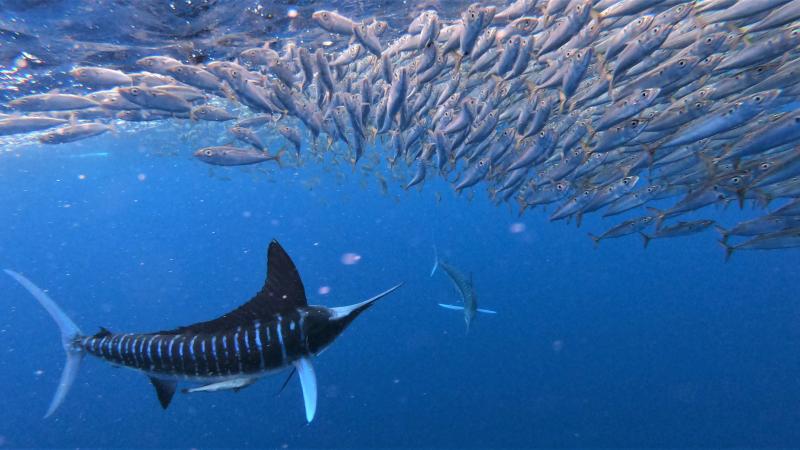
Photo: David Ausserhofer
Dr. Laskowski, what constitutes a fish personality?
Kate Laskowski: By the term ‘fish personality’, I mean their predictability: if, based on their past behaviour, I can predict how they will behave in a similar situation, they have a personality. Fish, for example, exhibit different degrees of activity or aggressiveness, and react differently to new environments or risky situations.
How can you test personality in fish?
We observe fish in standardised assays. One way of finding out more about different types of fish is to place them in a new arena with other vegetation or fish, i.e. in a new environment, and to observe their behaviour over several days or weeks: does a fish tend to be more active or passive? What happens in the face of danger?
Photo: David Ausserhofer
Such as?
We simulate a predatory attack by hitting the surface of the water with a bird skull. Almost all fish exhibit a strong anti-predator behavioural response to this where they either freeze or hide. We look to see how long it takes each fish to recover and to resume its normal swimming behaviour.
Why do fish have different personalities?
It is an important evolutionary mechanism to have a personality, i.e. to behave differently. This way, individuals might be able to reduce competition within their group, thus increasing their own individual success in terms of survival or reproduction. From a more proximate perspective, the behaviour of an individual fish is very much dependent on its development. For example, in experiments we conducted with clonal Mollies, i.e. fish that have an identical genetic make-up, we determined that their differences in behaviour can be a result of their early social experience. We paired up this fish at birth in such a way that we could control which fish would win a dominance fight. Some of the fish were paired in such a way that they always won a fight, other fish were paired in such a way that they always lost and still others paired so that sometimes they won and sometimes they lost.
… and what did you find out?
As expected, the Mollies that always won at a young age continued to dominate over their adversaries later in life – they were strong, dominant individuals. And this effect of early experience lasted much, much longer than previously thought – until well after sexual maturity. We then expected that the mollies that sometimes lost and sometimes won would, then, be expected to continue winning and losing later in life, too. On the contrary, however, they turned out to be the real losers.
Why was that?
These fish have come to realise that they can sometimes win, so they boldly attack the ‘natural winners’ – and lose. This is where the ‘loser fish’ come in. They challenge the vanquished fish, and finish them off, enhancing their position in the group.
Can these results be transferred to humans?
Maybe! Repeated failed attempts to perform a risky task may be something that is hard to cope with. But it also highlights the importance of being opportunistic – despite negative experiences early in life, some individuals can overcome this if they just wait for the right moment to make their move.
How do fish personalities influence their environment?
This issue is addressed in our latest project, which tested how the composition of personalities in perch groups influenced whole food web dynamics Perch have quite strong personalities; some individuals are relatively shy and inactive, whereas other individuals are relatively bold and active. We divided the perch into three groups: one containing exclusively shy individuals; one containing bold individuals only; and one with a mixture of both types. We then placed these fish into ponds and measured how these groups of perch affected the whole ecosystem. We measured changes in the composition of invertebrates – which the perch eat – and changes in algal growth and rates of leaf litter decomposition. The data is now being analysed; I expect that the ponds containing only active or inactive fish will differ the most: active individuals are likely to consume lots more invertebrates, leading to more prolific algae growth and less leaf degradation than with the inactive bass.
Are you particularly fond of a certain fish species?
I am very fond of sticklebacks. They seem more intelligent than other fish. You can almost see them thinking: “Is it okay for me to swim out now”? Mollies, on the other hand, are forever just thinking about food.




